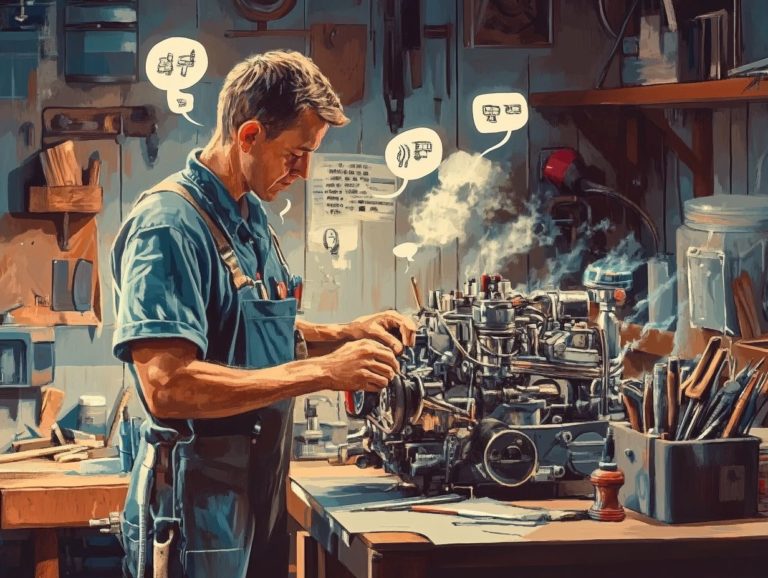5 Warning Signs of Common Engine Problems
Your car s engine is essentially its heart. When it begins to show signs of distress, it s crucial to take notice.
Whether it s that annoying check engine light or some strange noises, these indicators may point to deeper issues that jeopardize your vehicle s performance and safety.
This article will guide you through five common warning signs of engine problems, examining their potential causes and what actions you can take.
Stay informed to ensure your engine runs smoothly and sidesteps costly repairs in the future.
Contents
- Key Takeaways:
- 1. Check Engine Light Is On
- 2. Engine Is Making Strange Noises
- 3. Decreased Performance and Power
- 4. Engine Is Overheating
- 5. Smoke or Strange Smells Coming from the Engine
- What Are the Most Common Engine Problems?
- Frequently Asked Questions
- What are the 5 warning signs of common engine problems?
- What kind of strange noises should I be concerned about?
- How do I know if my engine’s performance has decreased?
- What warning lights should I pay attention to?
- What should I do if I notice leaking fluids?
- What are some unusual smells that could indicate engine problems?
Key Takeaways:

- Don t ignore the check engine light; it could indicate various issues that should be addressed immediately.
- Are strange noises coming from your engine? This could signal serious problems have it checked by a mechanic.
- If your engine isn t performing well, it could be due to several factors get it inspected by a professional.
1. Check Engine Light Is On
Is your check engine light flickering? This isn t just a minor annoyance; it s a signal that your engine might have issues needing immediate attention. Seeking reliable vehicle inspection services, like New Life Tires & Auto Repair in Salt Lake City, is essential.
This warning can indicate anything from a loose gas cap to serious malfunctions involving sensors or engine components. Timely engine checks are vital as they can accurately identify the root cause of the warning light, ultimately saving you time and money.
Using computer scans, technicians can delve into your engine’s metrics, uncovering any underlying concerns. Regular vehicle maintenance is crucial; it dramatically reduces the chances of encountering such alerts, leading to a smoother driving experience.
2. Engine Is Making Strange Noises
Is your engine making strange noises? Consider it a red flag indicating potential trouble that demands your immediate attention to prevent serious repair issues.
These unusual sounds can vary perhaps you hear a persistent knocking or tapping, suggesting complications with the valves or pistons. A high-pitched squeal often indicates a worn-out serpentine belt, while rumbling or grinding noises could signal transmission trouble or other critical components.
Recognizing these auditory clues is vital, as they often indicate significant issues that could undermine your vehicle’s performance. Conducting a thorough engine diagnostic is essential to identify any electrical problems that might contribute to those unsettling noises.
3. Decreased Performance and Power
Are you experiencing decreased performance and power in your vehicle? This could signal a range of issues, from fuel system malfunctions to driveability problems, especially in high-mileage cars.
Concerns may arise from faulty fuel injection systems that struggle to deliver the correct amount of fuel, causing inefficient combustion. The quality of fuel is equally important; low-grade or contaminated fuel can clog filters and hinder performance. Worn-out spark plugs can disrupt ignition and cause misfires, reducing power output.
To prevent these declines in power, conducting regular maintenance checks is crucial. Ensuring all components, from fuel lines to ignition systems, operate optimally will keep your vehicle running smoothly.
Don t wait act now to avoid expensive repairs later!
4. Engine Is Overheating

An overheating engine is serious trouble if not fixed quickly! This issue often arises from problems like coolant leaks or insufficient vehicle maintenance.
Common causes include a faulty thermostat, which is a part that controls how coolant flows, or worn hoses that let precious coolant escape. Regular inspections can help catch these problems early, as subtle signs might slip past your notice until they turn into major repairs.
By checking your fluid levels regularly, you can significantly lower the risk of overheating. This proactive approach not only helps maintain optimal engine performance but also extends your vehicle’s lifespan, keeping you safe from the steep costs of severe engine troubles.
5. Smoke or Strange Smells Coming from the Engine
Smoke or unusual smells from your engine are serious red flags. They may indicate issues ranging from oil leaks to problems with how the engine burns fuel, which can impact emissions.
Different types of smoke tell their own story:
- Blue smoke often means burning oil, signaling a leaky valve seal or a failing piston ring.
- White smoke can suggest coolant sneaking into the combustion chamber, often a sign of a blown head gasket.
- Black smoke usually points to excessive fuel consumption, suggesting an overly rich fuel mix or a malfunctioning fuel injector.
Recognizing these distinct odors and smoke types is crucial, as they can reveal deeper mechanical issues that may lead to costly repairs if ignored. Don’t wait! Inspect your vehicle now to catch potential problems early.
What Are the Most Common Engine Problems?
Understanding common engine problems is essential for your vehicle’s health. Early detection through engine diagnostics and keeping a service history can save you from expensive repairs later.
You might encounter issues like engine stalling, which often points to a fuel delivery problem, or electrical issues affecting ignition or starting. Fluid leaks are another red flag, suggesting underlying damage that shouldn t be ignored.
A detailed repair manual can help you accurately diagnose these symptoms. With step-by-step guides, these manuals empower you to pinpoint trouble spots and tackle necessary repairs.
Maintaining a thorough service history is vital. It helps you track recurring problems and ensures effective maintenance practices are in place, enhancing your engine’s longevity.
What Are the Possible Causes of a Check Engine Light?
The check engine light can turn on for a variety of reasons, from a loose gas cap to faulty spark plugs, or even issues within the fuel filter and ignition system that require your immediate attention.
These triggers can indicate anything from minor annoyances to serious problems. For example, a loose gas cap may lead to increased fuel evaporation, which isn t critical, but malfunctioning spark plugs can cause misfires that severely compromise engine performance.
A clogged fuel filter restricts fuel flow and can ultimately damage the fuel pump. Ignoring these warnings not only jeopardizes engine efficiency but also sets the stage for potentially costly repairs down the line.
Therefore, diagnosing the specific reason behind that pesky check engine light is crucial to prevent further complications and ensure your vehicle operates smoothly.
What Could Be Causing Strange Noises from the Engine?

Strange noises from your engine can indicate various issues, from electrical system malfunctions to exhaust system faults. It’s vital to diagnose the problem quickly to prevent further damage.
Mechanics listen for specific sounds to identify problems. For example, a rattling noise may point to loose components, while grinding sounds might suggest worn-out bearings or gears. Whining noises can also hint at issues within the transmission or power steering system.
By familiarizing yourself with these sounds, you empower mechanics to streamline the troubleshooting process, allowing them to focus on areas that need attention. Recognizing these clues not only aids repairs but also helps extend the overall lifespan of your engine.
How Can One Improve Engine Performance and Power?
Improving your engine’s performance and power can be achieved through several methods. Focus on optimizing the fuel system, maintaining a regular maintenance schedule, and using high-quality oil additives.
Enhancing your fuel injection system ensures your engine gets the right mix of air and fuel for efficient combustion, directly impacting horsepower and turning power. Regular oil changes are essential; clean oil reduces friction among moving parts, leading to smoother operation and a longer engine lifespan.
Maintaining clean air filters is also critical. They ensure that fresh air enters the engine, preventing contaminants from affecting performance. These strategies create a comprehensive approach for anyone looking to boost their vehicle’s efficiency and power.
What Are the Common Causes of Engine Overheating?
Engine overheating can arise from common issues such as low coolant levels, coolant leaks, and fluid leaks. This highlights the importance of a proactive maintenance schedule to catch these problems early.
Regular inspections help you spot wear and tear on hoses and clamps often overlooked until they lead to significant issues. A malfunctioning thermostat can disrupt coolant flow, causing unexpected spikes in engine temperature.
Efficiently managing your coolant levels is crucial. Make it a habit to check the reservoir regularly and refill it with the correct coolant type. Establishing a routine for monitoring fluid levels and seeking professional help for flushes and replacements when necessary will help maintain optimal engine health and prevent overheating.
What Do Different Types of Smoke or Smells Indicate About Engine Problems?
Different types of smoke or unusual odors can provide valuable insights into engine issues, pinpointing problems that range from oil leaks to combustion complications, all of which can negatively impact emissions.
By paying attention to these signs, you can differentiate between a simple maintenance issue and a serious engine malfunction. For instance, blue smoke typically suggests that oil is burning. Black smoke may indicate excessive fuel consumption due to an improper air-fuel mixture, while white smoke could mean coolant is entering the engine a situation that could cause severe damage if not addressed promptly.
Recognizing these signs early is essential. Timely diagnostics and repairs can prevent further complications, preserve your vehicle’s performance, and ensure your safety on the road.
Frequently Asked Questions

What are the 5 warning signs of common engine problems?
The 5 warning signs of common engine problems include strange noises, decreased performance, warning lights, leaking fluids, and unusual smells.
What kind of strange noises should I be concerned about?
Are you hearing rattling, knocking, or hissing sounds from your engine? These noises could signal a problem that needs a mechanic’s attention.
How do I know if my engine’s performance has decreased?
Is your car slow to accelerate? Is it using more fuel or stalling often? These may signal an engine problem.
What warning lights should I pay attention to?
Keep an eye on warning lights like the check engine light or oil pressure light. These could indicate engine issues that need immediate attention.
What should I do if I notice leaking fluids?
If you notice fluids like oil or coolant dripping from your engine, act quickly! Addressing leaks now can prevent serious damage.
What are some unusual smells that could indicate engine problems?
Smells like burning, oily, or sweet odors from your engine should not be ignored. These could point to potential issues that need inspection by a mechanic.






